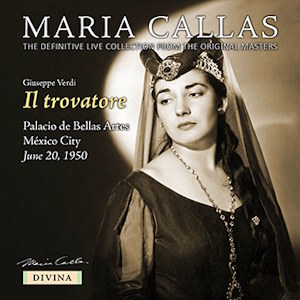
Giuseppe Verdi (1813-1901)
Il Trovatore (1853)
Leonora, Maria Callas (soprano); Azucena, Giulietta Simionato (mezzo-soprano); Manrico, Kurt Baum (tenor); Conte di Luna, Leonard Warren (baritone); Ferrando, Nicola Moscona (bass)
Chorus of Ópera Nacional
Orchestra of the Unión Filarmónica/Guido Picco
rec. 20 June 1950, Palacio de las Bellas Artes, Mexico City
Divina Records DVN-25 [137]
Divina Records is a specialist label that aims to provide the live recordings of Maria Callas in the best sound possible and the titles that are currently available are almost invariably the best sounding issues you will find. Sadly they have stopped CD production but their material is available for download on their website which I will link below the review for those interested.
This performance has long circulated in crumbly, distorted sound on labels such as Opera d’Oro and while it is certainly still nothing more than a rather poor sounding 1950 broadcast, it is now at least listenable if you are somewhat tolerant when it comes to historical recordings. Even before this remaster, Callas’ Mexico performance of Leonora was much lionised. She is in freshest voice, with huge, secure, and ringing high notes, and a poetic inspiration which even her more refined, if less vocally opulent, studio performance from six years later does not quite equal (review). Her ‘D’amor sull’ali rosee’ is worth the price alone as she creates a dreamy, improvisatory atmosphere which wrings every last drop of poetry from Verdi’s sighing melody. Her ascent to the high notes is secure at both forte and pianissimo and her top Db is quite startling in its magnitude. All the while she shades the text as only she could, with bountiful colour and elegant yet intensely expressive phrasing. She is no less wonderful in the rest of the opera with baleful chest tones in her ‘Miserere’ and startling virtuosity in her duet with the Conte di Luna and that’s still just the fourth act. It is hard to imagine that Verdi could have wanted anything more.
While the other soloists are not quite so special in their approach they are nonetheless very good. Giulietta Simionato turns in a thrilling interpretation of Azucena with exciting top notes and a biting lower register. She gives the role its proper worth and I’ve rarely heard it done better and so feel a little mean in wishing that, after her stunning Amneris the following year, Oralia Dominguez might have been cast instead and that then we might have had a performance to match the magnetism of Callas’ Leonora. But not to worry; Simionato is superb and not all too far off. Leonard Warren is, as always, throaty and slightly odd sounding, but despite his darkened vocal approach he actually manages to keep a great deal of his natural resonance and the result is still a voice of immense power. He also interprets quite sensitively in places with a lovely, introspective opening to ‘Il balen’.
Kurt Baum is nobody’s ideal tenor, and his basic timbre is not the most ingratiating – but what we would do for a dramatic tenor as capable today. His voice is large and ringing with good breath support, secure high notes and a decent legato. It is even more impressive when you realise that he was 50 years old here and went on singing at the Met for many years after. Del Monaco might have been a more exciting option or, if it were a little later, Corelli, but in all honesty neither of those tenors was ideal as Manrico either and to hear the role done properly you should really go back to the old Molajoli recording on Naxos with Francesco Merli (review).
Nicola Moscona is a very fine Ferrando, bringing plenty of character to his opening aria and the rest of the cast does not disappoint. In the past Guido Picco has been criticised, maybe somewhat unfairly, for his conducting. He does at least allow singers space when needed and creates plenty of excitement when the score calls for it. He doesn’t quite make the most cohesive argument for some parts of the opera and there are occasions when momentum seems to sag but I expect the fact that the orchestra is quite recessed here has contributed to the dismissal of his conducting, which is in all honesty neither extraordinary or particularly poor. The audience is clearly very appreciative of the performance and there is much enthusiastic applause throughout.
So, although the sound probably keeps this recording from being of interest to most people, it is a remarkable document of what was clearly an extraordinary night in the theatre. For anybody interested in ‘bel canto’ style singing, Callas’ Leonora is a must hear. You’ll probably want another Trovatore in more listenable sound and there are plenty of good ones: Sabajno, Molajoli, Cellini, Karajan, and Serafin are all more listenable and yet I don’t think any other performance gets quite as ‘hot’ as this one.
Morgan Burroughs
Availability: Divina Records Additional Cast
Ruiz – Carlos Sagarmínaga
Ines – Ana María Feuss


















